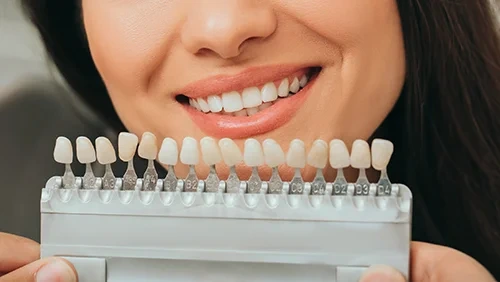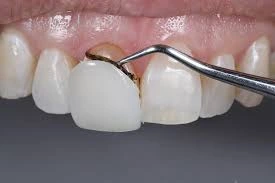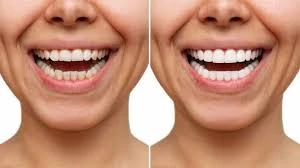
If you’re considering a smile makeover, you’ve likely encountered the debate between composite vs. porcelain veneers. Both options can significantly enhance your smile, yet they differ in materials, durability, cost, and application.
In this 2025 guide, ProfClinic details the advantages, drawbacks, and key distinctions, helping you choose the veneer option that best meets your needs.
What Are Porcelain Veneers?
Porcelain veneers are ultra-thin shells crafted from medical-grade ceramic in a dental laboratory to ensure a precise fit for your teeth. They are engineered to conceal imperfections such as stains, chips, gaps, and misalignments while preserving the natural translucency of real enamel.
Porcelain Veneers Before & After
Patients who choose porcelain veneers frequently experience
- Whiter, brighter teeth
- A significant boost in confidence
- Perfectly aligned and sculpted smiles
The transformation—observable before and after treatment—is often dramatic, particularly for individuals dealing with discoloration, worn enamel, or multiple dental issues.
Benefits of Porcelain Veneers
- Natural Appearance: Emulates authentic tooth enamel with lifelike light reflection.
- Long Lifespan: With proper care, it lasts 10–15 years.
- Stain Resistance: Exhibits high resistance to stains from foods and beverages.
- Durability: Offers greater strength and enhanced resistance to wear and breakage compared to composite veneers.
Read also: Porcelain Veneers: The Ultimate Guide

What Are Composite Veneers?
Composite veneers are fabricated from a tooth-colored resin that is applied directly to your teeth during a single visit. They are meticulously sculpted by your dentist to enhance the shape, size, and color of your teeth, offering a quicker and more budget-friendly alternative.
Composite Veneers Before & After
Composite veneers yield remarkable outcomes, particularly in addressing
- Minor chips and gaps
- Temporary cosmetic corrections
- Immediate enhancements to your smile
While they may not offer the same longevity as porcelain veneers, composite veneers still provide an impressive transformation for your smile.
Benefits of Composite Veneers
- Quick Application: Typically completed in a single appointment.
- Minimally Invasive: Often requires little to no removal of enamel.
- Easily Repairable: Easily can be retouched or repaired if damaged.
- Cost-Effective: Offers a more budget-friendly alternative compared to porcelain veneers.
Read also: Composite Veneers: Everything You Need to know

Porcelain vs. Composite Veneers
Understanding these key differences can help you determine which option best aligns with your lifestyle and goals.
Material & Appearance
- Porcelain: Exhibits superior translucency and a more natural appearance.
- Composite: While slightly less lifelike, it still offers an attractive aesthetic.
Durability
- Porcelain: Typically durable for 10–15 years or more.
- Composite: Generally lasts between 4 and 8 years.
Stain Resistance
- Porcelain: Provides enhanced resistance to stains over time.
- Composite: More susceptible to discoloration.
Application Time
- Porcelain usually requires at least two appointments.
- Composite is Often completed in a single visit.
Cost
- Porcelain: Involves a higher upfront investment.
- Composite: Features a lower initial cost, though it may necessitate more frequent maintenance.

Who Should Get Veneers?
Porcelain Veneers Are Ideal For:
- Enhancing long-term cosmetic appeal.
- Correcting deep stains or enamel damage.
- Achieving the most natural appearance
Composite Veneers Are Great For:
- Offering quick fixes and short-term improvements
- Accommodating patients with tighter budgets
- Addressing minor chips, gaps, or discoloration
How to Care for Your Veneers?
To maintain your veneers’ optimal appearance:
- Brush and floss daily
- Avoid biting on hard objects
- Limit coffee, tea, and tobacco consumption (especially with composite veneers)
- Use a night guard if you grind your teeth
- Schedule regular dental checkups and cleanings
Read also: 8 Most Common Types Of Veneers

Transform Your Smile with Prof Clinic
At Prof Clinic, we offer both porcelain and composite veneers that are meticulously crafted to complement your facial features and smile aspirations. Whether you’re aiming for a temporary enhancement or a long-lasting transformation, our team of expert cosmetic dentists will guide you every step of the way.
Choose from:
- Quick, affordable composite veneers
- High-quality, custom-made porcelain veneers
- Personalized smile designs using cutting-edge technology
Ready to upgrade your smile? Contact Prof Clinic in Turkey today and let our experts craft the ideal veneer treatment tailored just for you.
FAQs about Composite vs. Porcelain Veneers
Composite Or Porcelain… Which is better?
Porcelain veneers are renowned for their durability and natural appearance, while composite veneers offer a more cost-effective and speedy application. Ultimately, the ideal option depends on your specific aesthetic goals and budget.
Composite vs. Porcelain Veneers: Which Lasts Longer?
Yes, porcelain veneers typically last around 10–15 years with proper care, whereas composite veneers usually last between 4 and 8 years.
Are porcelain veneers more expensive than composite?
Yes, although porcelain veneers require a higher initial investment, they may offer long-term savings by minimizing the need for frequent maintenance.
Do Dental Veneers Look Natural?
Both options can achieve a natural look; however, porcelain veneers provide the most lifelike results due to their superior translucency.
Porcelain vs. composite fillings: which is better?
Porcelain veneers boast greater durability and superior aesthetics, whereas composite veneers offer a more cost-effective solution and simpler repair options.
Which dental veneers last the longest?
No veneer lasts forever, but with proper care, porcelain veneers typically have the longest lifespan.
Does Getting a Veneer Hurt?
The procedure is generally pain-free, as local anesthesia is administered during any enamel removal.
Can Veneers Stain?
Composite veneers can become stained over time, whereas porcelain veneers exhibit exceptional resistance to stains.
Do people regret veneers?
Regret is rare when patients choose experienced cosmetic dentists and fully understand the long-term commitment.
Why is Turkey so cheap for veneers?
Because of lower operational costs, competitive clinic pricing, and currency exchange advantages. Turkish clinics, like Prod Clinic, often bundle accommodation, transport, and consultation, delivering high value at lower prices without sacrificing quality when you choose accredited providers.
Can I get veneers on just my front teeth?
Yes. Many patients opt for 4–8 veneers on upper front teeth, which are most visible. This is cost-effective and often enough to dramatically enhance your smile. Customization ensures the treated teeth blend naturally with the rest.

